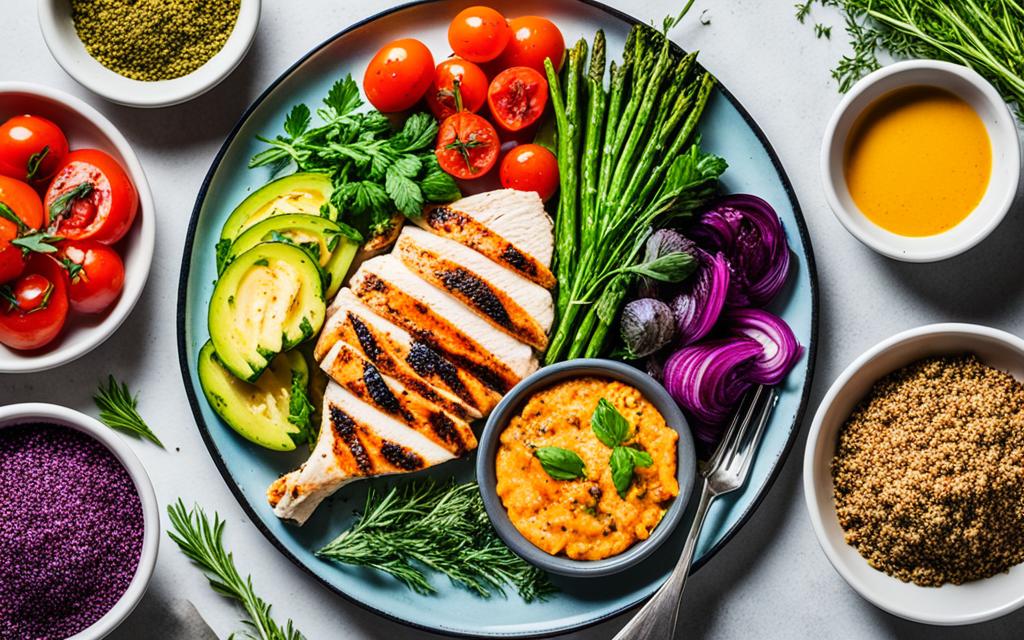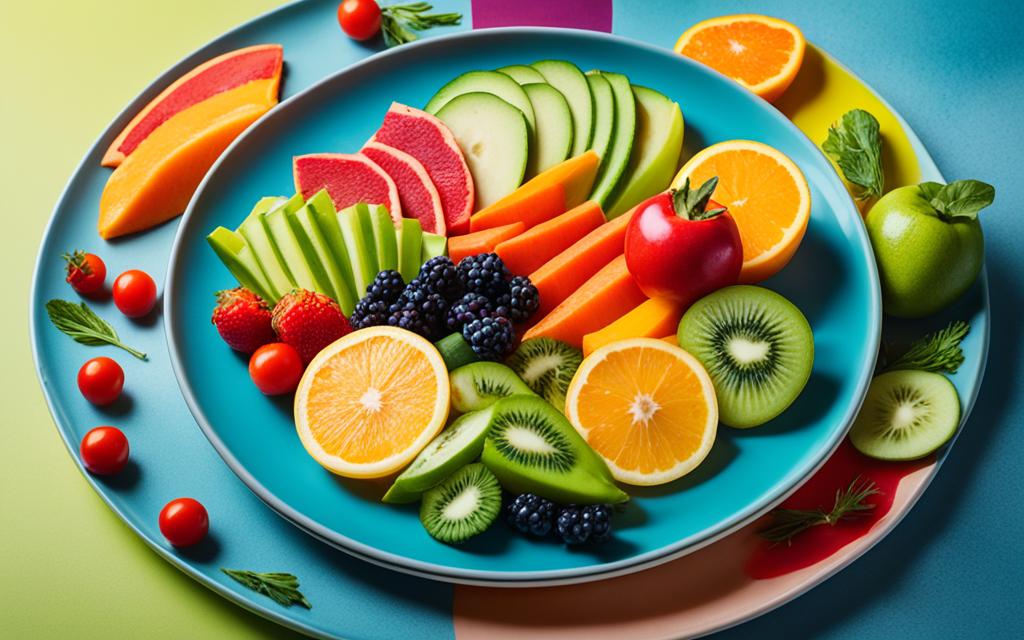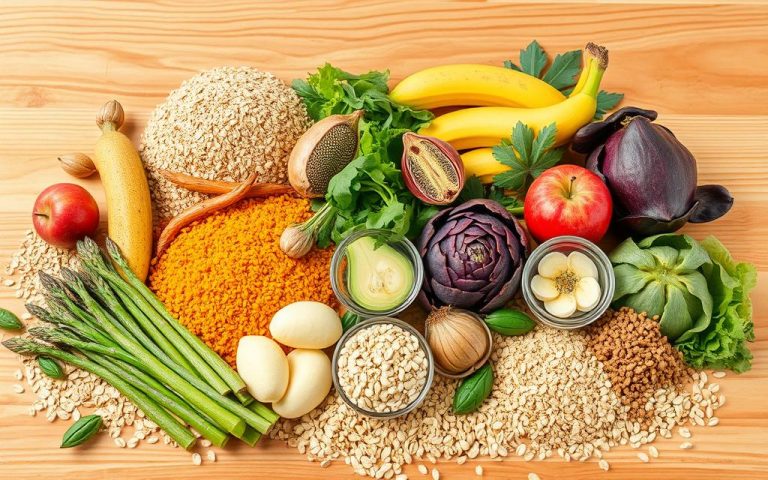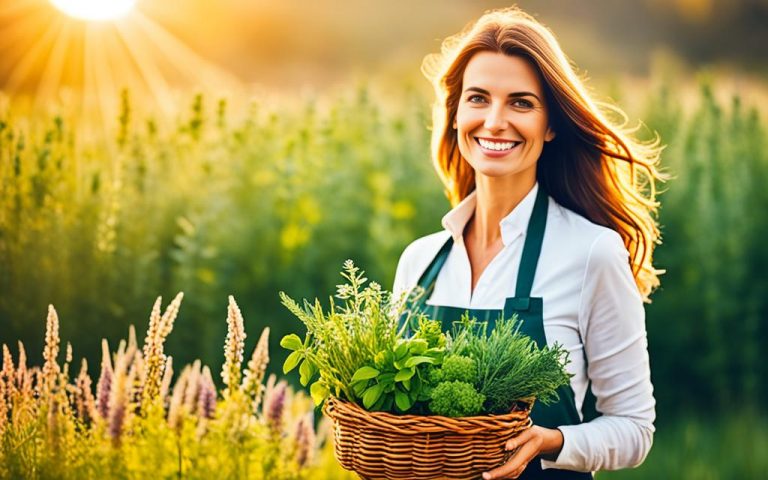Navigating Your Diet During Chemo: Essential Tips
Starting chemotherapy, you’ll face the challenge of eating right to help your healing. It’s key to eat well, but side effects make it tough. We’ll guide you on creating a diet plan to keep you strong and healthy. This plan is crucial for your recovery, helping you pick the best foods during this tough time.
When planning your diet during chemo, think about food and how it works with your treatment. Eating the right foods helps lessen chemo’s side effects and builds resilience. This article will show you key steps and what to eat to stay strong during this important time.
Key Takeaways
- Understanding the significance of a nourishing diet tailored to support chemotherapy treatments.
- Exploring foods that bolster energy and immune function during trials of treatment.
- Identifying dietary choices that can alleviate common chemo-induced side effects.
- Recognizing the importance of hydration and well-timed, proportionate meals.
- Establishing a balanced diet while being responsive to your body’s changing needs.
The Importance of Nutrition for Cancer Patients
While having chemotherapy, healthy eating during treatment is crucial. Cancer treatments can be hard on your body. This makes nutritional tips for chemotherapy very important for your health and wellbeing.
Understanding Nutritional Needs during Chemotherapy
Chemotherapy greatly increases your need for good nutrition. Treatments can raise your metabolism, making you need more calories and nutrients. A diet high in proteins and calories helps you keep your weight, support your immune system, and repair muscles.
How Proper Nutrition Can Help With Chemo Side Effects
Dealing with chemo side effects like nausea and tiredness can be tough. Following specific nutritional advice can greatly lessen these issues. Eating protein-rich foods and easy-to-digest carbs help you stay energized and fight fatigue. Also, eating small meals often can help with nausea and low appetite.
Knowing how diet affects chemo effects is important for a better life during treatment. Eating right helps you stay strong and deal with side effects better.
Starting Your Chemo Diet Plan: What to Know
Starting chemotherapy is a big step that needs a special diet plan. Having the right diet can make you feel better and stronger during treatment. It’s key to know which meal ideas for cancer patients are the best, and how they support your body during chemo.
Talking to a dietitian who knows about cancer care is a great first step. They can offer advice that fits your health needs and treatment, making your diet help you more.
- Choose foods that are easy on the stomach but full of nutrients to help with digestion.
- Pick meals that are rich in calories and protein to give your body energy and help it heal.
- Drink lots of fluids through soups and smoothies, as they are comforting and healthy.
It’s important to listen to your body’s needs at this time. Some treatments may cause nausea or change how food tastes, affecting what you want to eat. Changing your meals to fit these needs helps support your body during chemo and makes you more comfortable.
Adjusting your diet can ease chemotherapy’s physical effects and uplift your spirit. The aim is to create a diet that meets your health needs and fits your life, helping you through your cancer journey.
Every meal is a chance to feel better and strengthen your body’s fight against cancer.
Foods to Eat During Chemotherapy for Best Results
Choosing the right food during chemotherapy is crucial. It’s important to pick meals that provide the nutrients your body needs to heal. We will talk about the best foods to eat during chemotherapy and their benefits.
Energy-Boosting Foods
Chemotherapy might make you feel very tired. Eating foods that boost your energy can help you stay active. For example:
- Complex carbohydrates like oats and whole grains give you a steady energy supply.
- Lean proteins such as chicken, fish, and legumes help repair and maintain muscles.
- Fruits like bananas and apples not only give energy but are also gentle on your stomach.
Eating these foods can help keep your energy levels up, even on hard days.
Immune-Supporting Ingredients
Chemotherapy can weaken your immune system. To boost your body’s defenses, eat foods that support immunity, like:
- Garlic and ginger, which have natural anti-inflammatory and antibacterial effects.
- Spinach and kale, packed with vitamins A, C, and E, plus folate.
- Citrus fruits like oranges and lemons, which are rich in vitamin C.
A quick way to get these nutrients is by making a smoothie with berries and spinach.
Eating well during chemotherapy not only feeds your body but also helps in managing and recovering from treatment. Here are some meal ideas:
| Meal Type | Key Ingredients | Benefits |
|---|---|---|
| Breakfast | Oatmeal, Berries, Almond milk | Rich in fiber, antioxidants, and carbs for energy |
| Lunch | Chicken salad with leafy greens and nuts | Provides proteins, vitamins from greens, and energy from nuts |
| Dinner | Grilled fish, quinoa, steamed broccoli | Includes Omega-3s from fish, quinoa for protein, and vitamins from broccoli |
Choosing the right foods during chemotherapy can greatly improve your health and comfort during treatment.
Foods to Avoid or Limit During Your Treatment
When you’re getting chemotherapy, some foods and drinks might make things harder. They could impact your health and how well your treatment works. Knowing what to avoid or eat less of can help nutrition for cancer patients. It helps with healthy eating during treatment.
Potential Food Interactions with Chemotherapy
Some foods can mess with your chemotherapy drugs. They can change how well the drugs work or make side effects worse. Here are foods to watch out for:
- Grapefruit and grapefruit juice: These can mess with enzymes that break down certain chemotherapy drugs in your body, leading to increased toxicity.
- Excessive green tea consumption: Drinking a lot of green tea can affect liver enzymes and change how drugs work.
- Alcohol: It can weaken your immune system and make some chemo medications more toxic.
Foods That May Worsen Chemo Side Effects
It’s important to avoid foods that could make chemo side effects like nausea, inflammation, and low immunity worse:
- Raw or undercooked eggs, meat, and seafood: These can increase your risk of infection when your immune system is weak.
- Spicy and acidic foods: Foods like chili peppers and oranges can irritate your mouth and make sores worse.
- High-fiber foods: Normally good for you, but can make diarrhea worse during treatment.
Changing your diet to avoid or limit these foods can make a big difference. It can make you more comfortable and help your treatment work better.
| Food Item | Interaction/Effect | Recommendation |
|---|---|---|
| Grapefruit | Increases drug toxicity | Avoid |
| Alcohol | Increases toxicity, reduces immunity | Limit or avoid |
| Spicy Foods | Can cause or worsen mouth sores | Avoid during mouth sore episodes |
| Raw Seafood | Risk of infection | Avoid |
Staying Hydrated: Fluids that Support Your Body During Chemo
Drinking enough fluids is key to staying healthy, especially during chemotherapy. It’s essential to know how to support your body during chemo with the right drinks. This can make your treatment work better and ease side effects. Here you will find important nutritional tips for chemotherapy that focus on staying hydrated.
Here are the top drinks that keep you hydrated and support your health:
- Water: It’s pure, free of calories, and it’s the best option for staying hydrated.
- Electrolyte Solutions: These can help replenish the vital minerals your body loses during treatment.
- Clear Broths: Nutritious and comforting, they provide essential nutrients without being too heavy.
- Herbal Teas: They calm the digestive system and can help with nausea.
- Fruit Infused Water: Adds a refreshing flavor kick while keeping you hydrated.
Each kind of drink offers special benefits. They can easily fit into your daily routine. How to support your body during chemo often includes changing what you drink.
| Fluid Type | Benefits | Recommended Daily Amount |
|---|---|---|
| Water | Hydrates efficiently, flushes toxins | 8-10 glasses |
| Electrolyte Solutions | Replenishes essential minerals | 2-4 glasses |
| Clear Broths | Supports digestion, provides nutrients | 2-3 servings |
| Herbal Teas | Soothes the digestive system, helps with nausea | 3-5 cups |
| Fruit Infused Water | Boosts flavor, encourages more fluid intake | As desired |
It’s also crucial to know when you’re getting dehydrated. Watch out for signs like feeling dizzy, having a dry mouth, and less urine. If these happen, drink more fluids and talk to your doctor.
By following these nutritional tips for chemotherapy, you can improve how you feel and heal. Always work with your medical team to adjust these tips for your health.
Managing Nausea: Diet Tips to Alleviate Symptoms
Dealing with the tough side effects of chemotherapy, like nausea, can get better with some diet changes. Adding special meal ideas for cancer patients to your day can really help you handle symptoms well during treatment.
Anti-Nausea Foods to Include in Your Chemo Diet Plan
- Ginger: Known for its powerful anti-nausea properties, adding ginger to your diet can help alleviate symptoms.
- Peppermint: Sipping peppermint tea or even sucking on peppermint candies can provide relief from nausea.
- Crackers or Toast: Dry, bland foods such as crackers or toast can be easier to tolerate when feeling nauseous.
- Bananas: Easy to digest and rich in potassium, bananas can help replenish nutrients lost during episodes of nausea.
- Small, frequent meals: Eating smaller amounts more often can prevent your stomach from becoming too full, which can trigger nausea.
Having these foods handy and adding them to your diet during chemo can steady your stomach. It can also cut down on how often and how bad the nausea is.
Meal Timing and Portion Size Strategies
Eating right is crucial for those on chemotherapy. How and when you eat matters a lot. Using smart meal timing and portion sizes can really help with nausea.
| Meal Timing | Portion Size |
|---|---|
| Opt for smaller, more frequent meals throughout the day instead of three large meals. | Start with small portions and increase only if you feel you can tolerate more. |
| Avoid lying down immediately after eating to help prevent reflux, which can worsen nausea. | Light, broth-based soups can be nourishing without being too heavy. |
Other tips include keeping meals in a cool, quiet place to help make eating nicer and lessen nausea. Remember, each person reacts differently to chemotherapy. So, it’s key to adjust these meal ideas to suit your own needs and likes.
Chemo-Friendly Recipes to Keep You Nourished
Starting chemotherapy can be scary, especially with nutrition in mind. It’s important to find meals that are nourishing, good tasting, and easy on the stomach. We have chemo-friendly recipes that are easy to make and yummy. They support your health and ease the side effects of treatment.
Easy-to-Prepare Nutritious Meals
Choosing meals that are quick to make can help a lot. These foods are simple but packed with nutrients. They give your body what it needs with little cooking effort.
- Nutrient-Packed Smoothie: Blend one banana, a handful of spinach, a tablespoon of peanut butter, and a cup of almond milk for a revitalizing drink.
- Oatmeal with Fresh Berries: Cook oats with milk or water and top with fresh berries and a drizzle of honey for added antioxidants and a touch of sweetness.
- Chicken Soup with Vegetables: A warm bowl of chicken soup made with broth, pieces of chicken, carrots, and potatoes offers comfort and nutrition with every spoonful.
Recipes to Stimulate Your Appetite
Chemotherapy can make you lose your appetite. Our chemo-friendly recipes use flavors and textures that wake up your taste buds. They make eating a more pleasant experience.
- Ginger Salmon: Baked salmon with a ginger glaze can help alleviate nausea and stimulate appetite, making it a perfect dish for those undergoing chemotherapy.
- Minty Pea Soup: A light, refreshing soup with peas and hints of mint refreshes the palate and is easy on the stomach.
- Smooth Cottage Cheese with Pineapple: Cottage cheese paired with diced pineapple offers a creamy texture and a sweet, tangy flavor that can help incite a lessened appetite.

Maintaining a Balanced Diet During Chemo: A Guideline
When you’re going through chemo, eating right is key. You need a mix of big and small nutrients to help your body. Diet during chemo helps with recovery and well-being. To heal, it’s important to follow a healthy eating during treatment plan made just for you.
Now, let’s talk about why different foods matter and share tips for eating well.
- Proteins: Crucial for repair and recovery, include lean meats, fish, eggs, and plant-based sources like beans and lentils in your meals.
- Carbohydrates: They are your body’s primary energy source. Opt for whole grains like oatmeal, quinoa, and brown rice.
- Fats: Essential for nutrient absorption, focus on healthy fats found in avocados, nuts, seeds, and olive oil.
- Vitamins and Minerals: Fruits and vegetables are high in antioxidants and vitamins that support immune function and overall health.
Here’s a simple guide for how much of each food group to eat every day:
| Food Group | Recommended Daily Servings |
|---|---|
| Proteins | 3-5 servings |
| Carbohydrates | 6-11 servings |
| Fats | 2-4 servings |
| Fruits and Vegetables | 5-9 servings |
Adding variety to your diet during chemo helps deal with treatment better and speeds up recovery. It’s key to adjust your healthy eating during treatment plan with help from a doctor. This is because what works well for one person may not for another.
Diet During Chemo: Listening to Your Body’s Needs
Chemotherapy can change what you like to eat and lead to new food issues. This affects how much and how well you enjoy your food. It’s important to change your diet to get the right nutrition for cancer patients and keep enjoying your meals.
Adjusting Your Diet in Response to Changing Tastes
Chemotherapy might make food taste metallic or make you dislike some foods. By changing what you eat based on what your body tells you, you can start to enjoy food again. Try different seasonings and textures to find what you like now. Adding fresh herbs and light spices can cover up bad tastes.
Recognizing and Coping with New Food Sensitivities
New food problems can pop up because of treatment, leading to stomach issues like nausea or bloating. Writing down what you eat can help you figure out what foods cause problems and which are safe. It’s important to replace foods that bother you with ones that give the same nutritional value.
- Identify foods causing unpleasant reactions.
- Substitute with gentler alternatives.
- Consult a dietitian specialized in meal ideas for cancer patients to personalize your diet plan.
Changing your diet isn’t just about getting the right nutrients; it’s also about making eating a better experience during chemo. This can greatly improve your overall well-being.
Meal Ideas for Cancer Patients: Keeping Variety and Balance
When undergoing chemotherapy, it’s key to eat a variety of foods. The right meal ideas for cancer patients can greatly help with well-being and recovery. It’s important to plan meals that are not only healthy but also easy to make. This ensures you get all the nutrients needed each week.
Creating a Weekly Meal Plan for Convenience
Putting together a weekly meal plan is a smart move. It makes sure you eat different foods to eat during chemotherapy. This reduces stress by making meal choices easier. Listing meals that are nutritious and appealing saves time and makes meal prep easier.
Incorporating a Range of Macronutrients and Micronutrients
Make sure your diet includes proteins, carbs, fats, vitamins, and minerals. This variety makes meals satisfying and nourishing. It gives your body the energy and support needed during treatment.
| Day of the Week | Breakfast | Lunch | Dinner |
|---|---|---|---|
| Monday | Oatmeal with fresh berries | Grilled chicken salad | Steamed fish with vegetables |
| Tuesday | Yogurt with granola and honey | Turkey and avocado wrap | Beef stew with whole grain bread |
| Wednesday | Smoothie with banana and spinach | Lentil soup with side salad | Roast chicken with quinoa and broccoli |
| Thursday | Egg white omelette with mushrooms | Vegetable stir fry with tofu | Pasta with marinara sauce and lean meatballs |
| Friday | Pancakes with sliced almonds and syrup | Quiche with mixed greens | Baked salmon with sweet potato fries |
How to Support Your Body During Chemo with Smart Food Choices
Learning how to support your body during chemo is about more than diet changes. It’s about choices that boost treatment outcomes and your well-being. Here are helpful tips for a chemo diet plan designed for chemotherapy patients.
First, pay attention to food safety. Chemo can weaken your immune system, making you more prone to infections. Careful food handling and preparation are key to lower this risk:
- Thoroughly wash all fruits and vegetables
- Avoid raw or undercooked meats and eggs
- Use separate cutting boards for meats and vegetables
- Ensure that all dairy products are pasteurized
Next, focus on the nutritional value of your meals. The right foods can ease symptoms and boost your energy. Include lots of proteins, healthy fats, and carbs in your chemo diet. Here are foods to eat:
- Lean proteins like chicken, fish, and tofu
- Complex carbohydrates such as whole grains and legumes
- Healthy fats from avocados, nuts, and seeds
- Fruits and vegetables rich in vitamins and antioxidants
Staying hydrated is also vital. Drinking enough helps your body function well and eases chemo side effects. Try to drink at least eight 8-ounce glasses daily, especially water, herbal teas, or diluted juices.
Finally, listen to your body. Your appetite and tastes may shift during treatment. Adjust your chemo diet plan to fit your changing needs. If some foods become unappealing, find tasty, nutritious alternatives.
How to support your body during chemo is not just about fighting side effects. It’s about making choices that aid recovery and improve life quality. With informed food choices, you can give your body the tools to combat cancer and withstand chemotherapy’s challenges.
Healthy Eating During Treatment: Foods That Heal and Energize
Eating right during chemo helps meet your nutritional needs and boosts healing. Nutrition plays a vital role in managing chemotherapy symptoms. Foods with natural healing properties can revitalize your body and increase energy during treatment.
An anti-inflammatory or plant-based diet is highly beneficial. These diets include foods rich in antioxidants and phytonutrients, which combat inflammation and boost well-being. Wondering what foods to eat? Let’s look at some important types:
- Leafy Greens: Spinach, kale, and other leafy vegetables are full of vitamins and iron, crucial for energy and healing.
- Whole Grains: Foods like quinoa, brown rice, and oatmeal offer long-lasting energy with their complex carbs and fibers.
- Berries: Berries such as strawberries, blueberries, and raspberries are loaded with antioxidants that fight off stress in the body.
- Lean Proteins: Chicken, fish, and legumes aid in muscle repair and strengthen the immune system.
Adding these foods to your daily diet can ease side effects and boost your energy. Here’s a table to show the benefits of these food groups:
| Food Category | Key Nutrients | Benefits |
|---|---|---|
| Leafy Greens | Vitamins A, C, K, Iron | Boosts immune function and energy levels |
| Whole Grains | Fiber, B Vitamins | Provides sustained energy, supports digestion |
| Berries | Antioxidants, Vitamin C | Helps combat oxidative stress, enhances recovery |
| Lean Proteins | Protein, B Vitamins | Essential for muscle repair and immune system support |
Knowing the nutritional content and benefits of these foods can help you eat a balanced diet during chemo. Your diet is a key ally in recovery, offering both nourishment and healing benefits.
Supplements and Vitamins: Do They Help During Chemotherapy?
Understanding supplements and vitamins is key for nutrition for cancer patients. When on chemotherapy, the body may need more nutrients. It’s vital to talk to doctors about supplements to avoid bad reactions with treatment.
The Role of Vitamin Supplementation
Vitamins and supplements can support your treatment, helping with side effects and improving well-being. They might ease fatigue and bolster your immune system. But, their effectiveness and safety widely differ, so choose carefully.
When to Consult Your Doctor About Supplements
It’s crucial to talk to your doctor before taking new vitamins or supplements. They will offer advice that fits your treatment and health, ensuring your nutrition for cancer patients is handled right.
Eating well during treatment helps too. Foods full of nutrients may be all you need, depending on your health and treatment. An oncology dietitian can give tips on what to eat.
In summary, supplements can help, but they’re not a replacement for a balanced diet. Always check with your doctor before changing your diet or starting supplements. They should help your treatment, not hinder it.
Conclusion
Going through chemotherapy is tough. But understanding how diet can help makes a big difference. We’ve seen how vital nutrition is for those undergoing cancer treatment. A good diet gives you energy and strength. It also helps ease some chemo side effects.
Nutrition is key to handling chemo. What you eat and drink and how you deal with symptoms like nausea are crucial. These elements help you through the treatment process.
Talking with your healthcare team is very important during this time. They give advice that fits your health needs. This guidance helps you pick the right food for your recovery. Remember, your nutritional needs might change as your body goes through treatment.
As your condition changes, so should your diet. Adjusting your diet helps you respond well to these changes. This adaptation is critical.
Your recovery journey is yours alone. While diet advice provides a starting point, it should match your needs and likes. By choosing the right food, paying attention to your body, and working with your doctors, you can face treatment with courage. We hope this guide helps you make good health choices during this crucial time.
FAQ
What are the nutritional challenges for cancer patients undergoing chemotherapy?
Cancer patients on chemotherapy often have higher nutritional needs. They may battle side effects like loss of appetite and nausea. A balanced diet is key to maintaining their weight, muscle, and immune strength during treatment.
How can proper nutrition help with chemo side effects?
Good nutrition can ease chemotherapy side effects. It gives energy, helps repair tissues, and boosts the immune system. It also helps with fatigue and stomach issues.
What should I include in a chemo diet plan?
A chemo diet plan should be based on your health and treatment. It should have proteins, carbs, fats, vitamins, and minerals. Foods that boost energy and support immunity are good. Always consult a healthcare professional for advice.
Are there foods I should eat during chemotherapy to improve my results?
Yes. Eat foods that give you energy and support your immune system. This includes complex carbs, lean proteins, fruits, and vegetables. Omega-3 fatty acids are also helpful. Look for chemo-friendly recipes.
What foods and substances should I avoid or limit during chemotherapy?
Avoid or limit alcohol, grapefruit, and raw or undercooked foods due to infection risk. Also, cut down on sugary, fatty, and processed foods as they can worsen side effects.
How important is it to stay hydrated during chemotherapy?
Staying hydrated is critical during chemotherapy. It helps with side effects, keeps kidneys working, and aids healing. Drink lots of fluids like water, herbal teas, and broths, unless told otherwise by a doctor.
What dietary changes can I make to manage nausea during chemo?
To fight nausea, eat ginger, plain crackers, and light meals. Have smaller, more frequent meals and stay away from strong smells. Plan your meals and watch portion sizes.
Can you suggest any easy-to-prepare chemo-friendly recipes?
Chemo-friendly recipes should be easy on the stomach and nutritious. Try smoothies, oatmeal, broiled chicken with veggies, or soups like lentil. They should be nutrient-rich but not overly rich.
How do I maintain a balanced diet during chemotherapy?
For a balanced diet, mix fruits, veggies, lean proteins, whole grains, and healthy fats. This ensures you get essential nutrients. Chat with a dietitian to tailor your diet to your needs.
How do I adjust my diet in response to changing tastes during chemo?
Chemo can change how things taste. Try new foods if you need to. If foods taste metallic, use plastic utensils and glass cookware. Rinse your mouth before meals and add herbs and spices for flavor.
What are some meal ideas for cancer patients that ensure variety and balance?
Cancer patients should try diverse meals with different proteins, grains, and colorful veggies. Consider meals like grilled salmon with quinoa, turkey wraps, or veggie stir-fries with tofu or chicken.
How can I safely support my body during chemotherapy through food choices?
Ensure your food is fully cooked to avoid infection and practice good hygiene. Pick nutritious foods that are easy to digest and comforting.
How do healing foods and diet types like anti-inflammatory or plant-based diets contribute to recovery?
Healing foods can reduce inflammation and help tissue repair. Diets like anti-inflammatory or plant-based boost health with beneficial nutrients.
Should I consider taking supplements or vitamins during chemotherapy?
Talk to your doctor before taking any supplements or vitamins. They can address deficiencies and support health but don’t replace a balanced diet.







